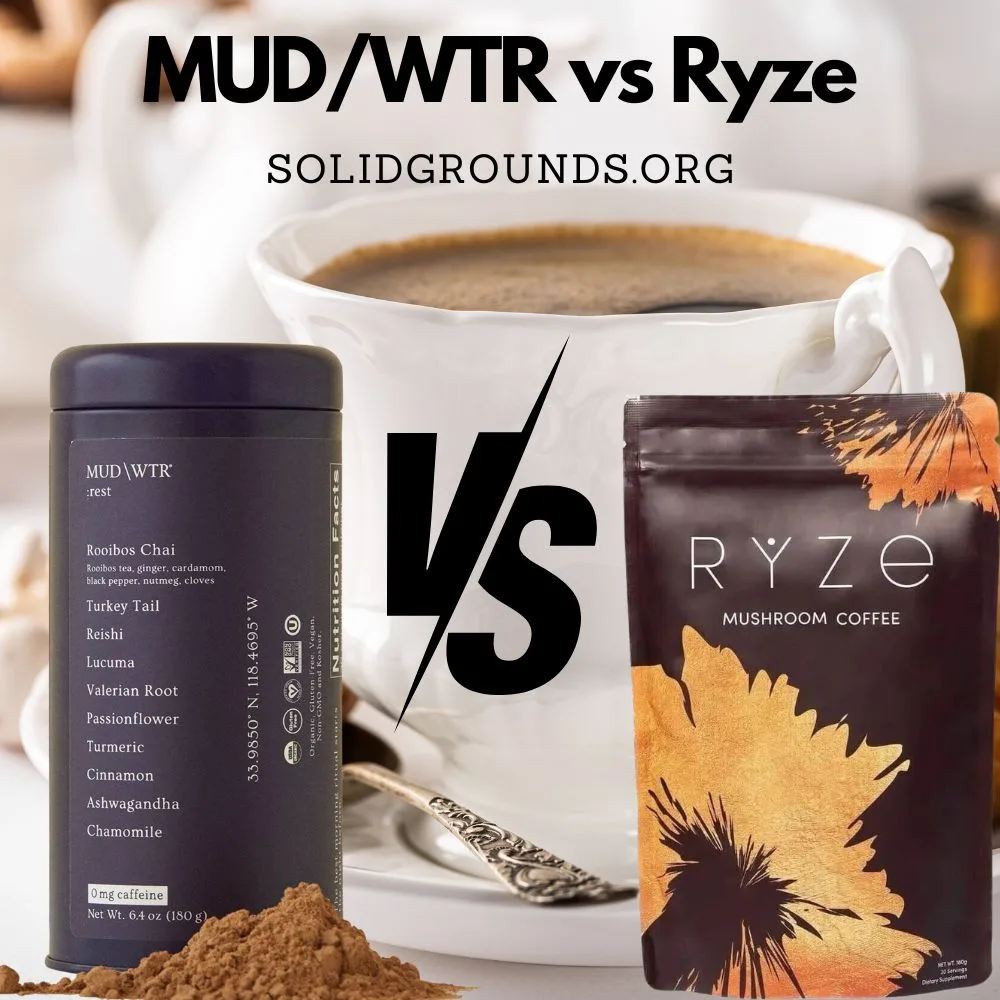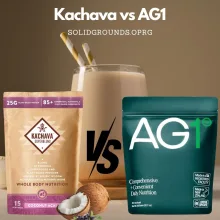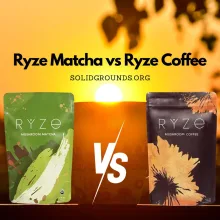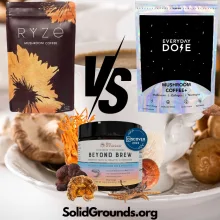MUD/WTR vs Ryze | Solid Grounds
In the burgeoning world of functional and adaptogenic coffees, two prominent players are mud wtr and Ryze. This in-depth comparison explores the unique features, claimed benefits, and potential drawbacks of these two coffee alternatives. Mud wtr stands out with its proprietary blend of adaptogenic mushrooms and herbs, offering a lower-caffeine, wellness-focused experience. Ryze, on the other hand, blends cordyceps and lion’s mane with a slightly higher caffeine content, aiming to provide a more coffee-like drinking experience.
Key differences lie in the ingredient profiles, nutritional compositions, and flavor profiles, catering to a range of consumer preferences. Ultimately, the choice between mud wtr and Ryze comes down to individual needs, health goals, and willingness to invest in a premium functional coffee. By understanding the nuances of these two brands, readers can make an informed decision on the best fit for their lifestyle.
MUD/WTR vs Ryze Comparison Table
 MUD/WTR vs Ryze |  MUD/WTR |  Ryze |
Ingredient Quality & Nutrition | (packed with adaptogens, mushrooms, herbs) | (mushrooms but fewer additional botanicals) |
Taste & Flavor Profile: | (earthy, herbal - an acquired taste) | (richer, more coffee-forward flavor) |
Energy & Focus Effects | (balanced, sustained energy from adaptogens) | (bigger caffeine kick from robusta beans) |
Convenience & Versatility | (mixes easily into water, milk, smoothies) | (same versatility but stronger coffee taste) |
Value for Money | ($25-40 for ~14 servings) | ($20-30 for ~30 servings) |
Overall Rating | Overall Rating: 8/10 | Overall Rating: 7/10 |
Latest Price |  |  |

Mud Wtr vs Ryze: Exploring the Functional Coffee Alternatives
The New Coffee Alternative
In the perpetual quest for better energy, focus and overall wellness, a new breed of “functional” coffee alternatives has emerged. Led by brands like Mud WTR and Ryze, mushroom-infused coffee drinks promise to deliver all the buzz without the subsequent crash. But are these trendy fungi-fueled brews really the superior choice? Let’s take a look at how they stack up.
The Brand Origins
Mud WTR kicked off the mushroom coffee craze in 2018, founded by an eclectic group of entrepreneurs, investors and scientists in Los Angeles. Their mission was to combine ancient medicinal mushrooms and herbs into a modern wellness beverage. All Mud WTR products are certified organic, vegan, and free of major allergens.
Ryze followed shortly after in 2019, the brainchild of a group of founders based in Austin, Texas. With a bit more of a traditional coffee company approach, Ryze doubles down on premium coffee beans infused with mushroom extracts. Their ingredients are non-GMO and third-party tested.
Mushroom Ingredients Breakdown
At their core, both Mud WTR and Ryze feature a blend of functional mushroom varieties celebrated for their health-promoting properties. The most common are lion’s mane (shown to support focus and cognitive function), cordyceps (for energy and vitality), reishi (immune support) and chaga (antioxidant levels through the roof).
Where they diverge is in the additional ingredients. Mud WTR is more of an “adaptogen latte” loaded with herbs like ashwagandha, turmeric, cacao and cinnamon. Ryze keeps it more “coffee-forward” by using premium arabica and robusta beans along with mushrooms.
Potential Downsides to Consider
Before you run out and load up your cart, it’s important to look at some of the potential downsides of these mushroom brews:
Digestive Discomfort
Certain mushroom varieties like lion’s mane and cordyceps contain high levels of polysaccharides that can cause gas, bloating or upset stomach for some, especially in larger doses. Start slow if you have a sensitive gut.
Disappointing Effects
While there’s some promising research, the majority of claimed mushroom benefits are still quite anecdotal. Many reviewers report not feeling much different than regular coffee.
High Caffeine Levels
Ryze in particular packs a more substantial caffeine punch than traditional coffee thanks to the robusta beans. This could be a pro or con depending on your caffeine sensitivity.
The Polarizing Taste
Let’s be honest – the mushroom flavor is polarizing. Chances are you’ll either love or hate the earthy, savory notes reminiscent of beef broth or umami. Mud WTR is often described as more of an “acquired taste” compared to the more conventional Ryze.
Premium Pricing
At $25-40 per bag for Mud WTR and $20-30 for Ryze, these aren’t your typical daily caffeine solutions for the budget-conscious consumer. The costs can really add up if incorporating into your routine.
Head-to-Head Comparison
So how do they truly measure up in terms of taste, price and performance? Here’s a head-to-head breakdown:
Taste Test
While subjective, most would agree that Ryze has a richer, more familiar coffee taste thanks to using actual beans as the base. Mud WTR’s flavors lean more herbal and mushroom-forward. A dose of creamer or alt-milk can help smooth out textures.
Energy Boost
Ryze delivers more of a traditional caffeine kick akin to a few shots of espresso. Mud’s steadier, balanced energy comes more from the nutrient-dense botanicals like rhodiola and cacao.
Cognitive Enhancer?
For purported benefits like focus, creativity and mental acuity, lion’s mane mushroom is the star ingredient found in both. Anecdotal evidence seems to slightly favor its effects in Mud’s more concentrated doses.
Immune Support
With reishi, chaga and other immune-boosting ‘shrooms, both brands make bold claims that their concoctions can help support a stronger, more resilient body. More research is still needed to validate these advantages.
Value Comparison
A bag of Mud WTR gets you around 14 servings for $25-40 while Ryze offers about 30 servings for $20-30. With such premium, buzzworthy ingredients, you’re certainly paying a premium either way. Subscription plans can help reduce costs slightly for both.
The Final Verdict
When it comes to mushroom-based brews like Mud WTR and Ryze, there’s certainly an intriguing appeal – who wouldn’t want to biohack their way to sharper focus, more energy and better overall health? The question is whether these functional blends truly deliver enough proven benefits to justify their premium price tags.
For coffee purists, Ryze’s more familiar roast profile and straightforward energy boost will likely be the easier sell. But wellness enthusiasts looking to take their daily supplement routine to new heights may be more swayed by Mud WTR’s nutrient-dense botanicals and adaptogens.
At the end of the day, moderation is key with both of these potent brews to avoid potential downsides like digestive woes or overcaffeination. It’s also wise to temper your expectations – they may indeed provide an extra kick compared to plain coffee, but likely won’t produce dramatic, life-changing results.
The Future of Mushroom Coffee
The mushroom coffee craze is still in its early stages, so only time (and more rigorous studies) will tell if these functional fungi-blends truly live up to the hype. For now, they can make an intriguing occasional treat for those looking to spice up their morning mug.
 |  |
FAQs and Answers
What are the key functional ingredients in mud wtr and Ryze, and how do they differ?
The key functional ingredients in mud wtr and Ryze differ in the following ways:
Mud wtr Ingredients:
Proprietary blend of adaptogenic mushrooms including chaga, lion’s mane, and reishi
Herbs and spices like turmeric, cinnamon, and himalayan salt
Low caffeine content, with the focus on the energizing and cognitive benefits of the mushrooms
Ryze Ingredients:
Blend of adaptogenic mushrooms like cordyceps and lion’s mane
Higher caffeine content derived from coffee bean extracts
Additional adaptogens and herbs like rhodiola and ashwagandha
The main distinction is that mud wtr relies more heavily on the mushroom blend as the primary functional ingredients, while Ryze combines mushrooms with a higher caffeine content from coffee sources. Mud wtr aims to provide a gentler, mushroom-based energy boost, while Ryze leans more into a coffee-like experience with adaptogenic support. The specific blends and ratios of these key ingredients also differ between the two brands.
How do the caffeine levels in mud wtr and Ryze compare to a regular cup of coffee?
The caffeine levels in mud wtr and Ryze differ significantly when compared to a regular cup of coffee:
Mud wtr Caffeine Levels:
Mud wtr has a relatively low caffeine content, with around 35-50mg of caffeine per serving.
This is significantly lower than a typical 8oz cup of coffee, which can contain 95-200mg of caffeine depending on the brewing method and bean variety.
Ryze Caffeine Levels:
Ryze contains a higher caffeine content compared to mud wtr, with around 70-90mg of caffeine per serving.
While higher than mud wtr, the caffeine in Ryze is still lower than a regular cup of coffee.
The key difference is that mud wtr is focused more on the adaptogenic and energizing properties of its mushroom blend, relying less on caffeine. Ryze, on the other hand, aims to provide a caffeine boost that is more in line with traditional coffee, while still incorporating adaptogenic ingredients.
This distinction is important for consumers who are looking to reduce their caffeine intake but still want the cognitive and energy-boosting benefits of a functional coffee alternative. Mud wtr may be the better option for those sensitive to caffeine or looking for a gentler stimulant effect.
Are there any third-party tests or certifications for the purity and quality of the ingredients in mud wtr and Ryze?
Based on the information available, both mud wtr and Ryze have undergone some third-party testing and certifications to validate the quality and purity of their ingredients:
Mud wtr:
Mud wtr’s ingredients are certified organic and non-GMO.
The brand states that its products are third-party lab tested for heavy metals, pesticides, and microbiological contaminants.
Mud wtr also claims its facility is cGMP (current Good Manufacturing Practices) certified, ensuring quality manufacturing standards.
Ryze:
Ryze’s ingredients are certified organic and its final products are third-party tested for purity and potency.
The brand has obtained NSF certification, which verifies that Ryze follows good manufacturing practices and that its formulation matches what is stated on the label.
Ryze also provides Certificates of Analysis (COAs) for its products, showcasing the results of third-party testing for contaminants.
Both mud wtr and Ryze seem to prioritize transparency and quality assurance through third-party certifications and testing. This can help provide consumers with a higher degree of confidence in the purity and safety of the ingredients used in these functional coffee alternatives.
It’s worth noting that while these certifications and tests are a positive sign, consumers should still do their own research to ensure the brands’ claims align with their personal health and safety standards.
What are the potential side effects or contraindications of consuming mud wtr and Ryze?
When it comes to the potential side effects or contraindications of consuming mud wtr and Ryze, here’s what we know:
Mud wtr:
Side effects are generally mild, with some users reporting digestive discomfort, such as bloating or stomach upset, when first trying the product.
Those with existing medical conditions, especially autoimmune disorders, should consult a healthcare professional before consuming mud wtr, as the adaptogenic mushrooms may interact with certain medications or exacerbate certain conditions.
Individuals with caffeine sensitivities may still experience jitteriness or anxiety, even though mud wtr has a relatively low caffeine content compared to regular coffee.
Ryze:
The higher caffeine content in Ryze may cause side effects such as headaches, insomnia, or increased heart rate in some individuals, especially those with caffeine sensitivities.
Consumers with certain medical conditions, such as heart disease, high blood pressure, or anxiety disorders, should speak with their healthcare provider before incorporating Ryze into their routine, as the caffeine and adaptogenic ingredients may interact with medications or exacerbate symptoms.
Pregnant or breastfeeding women, as well as children, should exercise caution or avoid Ryze, as the safety of the adaptogenic ingredients for these populations has not been extensively studied.
It’s important to note that individual responses to mud wtr and Ryze can vary significantly based on factors like age, underlying health conditions, medication use, and personal sensitivity to the active ingredients. Consumers are advised to start with small servings, monitor their reactions, and consult a healthcare professional if any adverse effects occur.
How do the subscription options and pricing structures of mud wtr and Ryze compare, and are there any discounts or promotions available?
Mud wtr and Ryze offer different subscription options and pricing structures for their functional coffee alternatives:
Mud wtr Pricing and Subscriptions:
Mud wtr is priced at $40 for a 30-serving bag when purchased one-time.
Subscription options are available, which provide a 15% discount, bringing the per-bag price down to $34.
Mud wtr also offers larger bulk sizes, such as a 90-serving bag for $90 (or $76.50 with a subscription).
The brand frequently runs promotions, such as first-time buyer discounts and limited-time bundle deals.
Ryze Pricing and Subscriptions:
Ryze is priced at $35 for a 30-serving bag when purchased one-time.
Subscription options are available, providing a 10% discount and bringing the per-bag price to $31.50.
Larger sizes, such as a 60-serving bag, can be purchased for $60 (or $54 with a subscription).
Ryze occasionally offers limited-time discounts or bundles on its website.
When comparing the two brands, mud wtr generally has a higher one-time purchase price but offers a more substantial subscription discount at 15%, compared to Ryze’s 10% subscription discount.
Both brands provide value through their subscription programs, which can result in significant cost savings for regular consumers of their functional coffee alternatives. Additionally, keeping an eye out for any promotional offers or limited-time deals can further enhance the overall value proposition.
Consumers should consider factors like their anticipated consumption rate, budget, and preference for subscription discounts when deciding which brand offers the better pricing and accessibility based on their individual needs.






